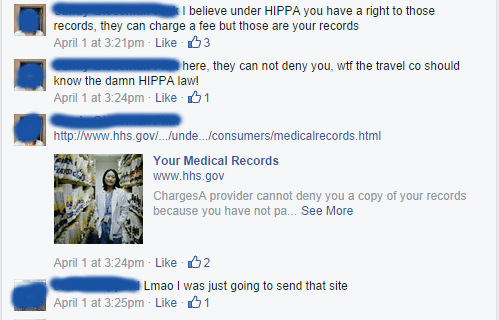Are Travel Nursing Agencies Required to Provide Medical Records?
Maintaining updated medical records is a common requirement for healthcare professionals. Doing so is only a minor burden when a healthcare professional maintains permanent employment. However, travel nurses switch employers much more often than their permanent counterparts and each new employer must obtain a full set of compliance records.
So travelers could potentially duplicate their efforts several times throughout the year. This leads many travel nurses to request copies of their medical records from their travel nursing companies. Some companies comply and others do not, which leaves many travelers wondering if travel nursing agencies are somehow required to provide them with their medical records. We’ll answer this question and address other pertinent issues in this blog post.
Why are medical records a burden for travel nurses?
As mentioned above, travelers are much more likely to switch companies than permanent employees. In fact, it’s not uncommon for travelers to work with several companies in any given year. They may work with multiple agencies as well as local PRN agencies.
Each new agency the traveler works with must accumulate and maintain a full set of documentation, including medical records, in order to put the traveler to work. So travelers can potentially end up duplicating multiple medical examinations. This can be a major inconvenience for the traveler.
It takes time to get these examinations completed. Travelers must coordinate with the agency on scheduling the exams. They must drive to the clinic and wait to have the exams administered. And who wants to get poked and prodded to begin with?!
Moreover, lacking the required documentation can cause delays in getting to work. In almost every case, results take time to be obtained. Blood work typically takes 3-5 business days to return. PPD exams can’t be read for at least 2 days. On rare occasions, results get lost or simply take an inordinate amount of time to be received. As a result, start dates may get pushed back because the documents aren’t received in time. Worse yet, contracts may even get cancelled.
This is why maintaining a great set of documents is imperative for travel nurses. However, every travel nurse is bound to take a medical exam through an agency at some point or another. As a result, they’re likely to be in a situation where they’ll feel compelled to ask the agency to provide the documents for their own records. This often happens when the traveler is switching companies.
As mentioned above, some agencies will send the documents right over, no questions asked. However, other agencies will refuse to send the documents. This leads many travelers to question whether or not it’s required for agencies to provide the documents.
Are agencies required to provide travel nurses with medical records?
There are really two different questions here. First, are agencies required to provide the documents? Second, should agencies provide the documents?
In answering the first question, you’ll find many travelers and recruiters claiming that the law requires agencies to provide the medical records. Here is a sample of arguments recently offered on a popular social media platform dedicated to travel nursing:
As you can see, the argument is that HIPPA, the federal law governing health information privacy, requires agencies to provide a traveler with their medical records when requested.
Unfortunately, this is not true. But it’s also not really a problem for travel nurses as they can still obtain the copies they need. You see, HIPPA applies only to “Covered Parties” as defined by the law. And “Covered Parties” are defined as health plans, healthcare clearinghouses, and healthcare providers. In fact, the law specifies that it does not pertain to employers and agencies are employers. Bottom line, agencies are not required by law to provide travelers with copies of their medical records.
But all is not lost for travelers seeking to obtain copies of their records. This is because HIPPA requires the healthcare provider that administered the exam to provide you with copies. Moreover, they can only charge a nominal fee to cover the cost of copying and mailing the records. Therefore, it’s always best for travelers to request a copy of all documentation from the lab, preferably at the time of the exam or test. Otherwise, travelers need to maintain records of what exams they completed and where the exams were administered, which is more of a hassle.
Should travel nursing agencies provide travelers with copies of their medical records?
Why don’t some agencies provide them?
With this in mind, we can discuss whether or not agencies should provide their travelers with copies of their medical records when requested. Considering that it takes the agency limited time and resources to complete such a request, the better question might be why wouldn’t they oblige such requests?
There are two common reasons that agencies give for maintaining policies against providing medical records to their travelers. First, holding the documents gives the agency a competitive advantage over other agencies. Most agencies don’t blatantly state the argument as such, but they use language that essentially means the same thing. For example, take a look at the statement below:
Note that the first recruiter refers to the medical records as “proprietary information”. You have to use a VERY broad definition of “proprietary information” in order to cite medical records as such. This is really just a politically correct way of saying that withholding the medical records gives the company a competitive advantage. In fact, the definition of “proprietary information” is:
Sensitive information that is owned by a company and which gives the company certain competitive advantages.
Agencies know that travelers do not like going through the paperwork process required to get up and running with a new agency. Obtaining medical records is part of that of process. Moreover, for them to provide the documentation would only make the onboarding process easier for their competitors. It will also make the onboarding process less expensive for their competitors. Finally, it will ultimately make it easier for their competitors to lure away their prized employees.
Many will phrase this reason as “making it difficult for the traveler to leave” or “keeping the traveler beholden to the agency”. That maybe a fair depiction. However, it’s more accurate to view this action as a means to making life more difficult for the agency’s competitors.
Second, agencies are concerned with potential HIPPA violations. HIPPA violations are a very serious matter. Divulging and transmitting medical data opens the agency up to liability. Moreover, JCAHO has its own privacy rules which are largely in line with HIPPA rules. If an agency maintains a lose policy that allows recruiters to send medical records at the request of travelers, then they maybe opening themselves up to liability. It’s important to note that medical release forms do not absolve agencies of all liability pertaining to medical record privacy. Agencies must still validate and monitor requests for legitimacy and accurate delivery.
Larger companies are at greater risk of error. They have more travelers working and therefore handle a higher volume of requests. Moreover, they have more recruiters and therefore a more difficult task in adequately training their representatives and properly managing all the requests they receive. So the larger the company, the greater the risk.
While there maybe other reasons that agencies give for withholding documents, these are the two most prominent.
Why should agencies provide medical records on request?
Of course, many agencies will gladly provide the documents. The way they see it, the traveler is easily able to obtain them from the providers who administered the exams in the first place. So for them, the idea that withholding documents gives them a competitive advantage is misguided. And they obviously believe that they are able to adequately manage the risk involved with transmitting private medical records.
Instead, they feel that they’re providing exceptional customer service by fulfilling these requests. By doing so, they believe that they will be rewarded with return and referral business in the long run. As one recruiter put it:
What does all this mean for travelers?
It’s fair to say that travelers would commend those agencies that fulfill requests for medical documentation. However, given the number of agencies that maintain policies prohibiting their representatives from fulfilling such requests, travelers shouldn’t be surprised when the requests are denied. Of course, it’s definitely fair and understandable to negatively judge such companies.
In any case, requesting copies of the records from the provider while taking the exams is always the best approach. Providers are the ones who are legally required to fulfill medical record requests. Moreover, requesting the records at the time of the exam will save travelers time, trouble and money in the long-run.









